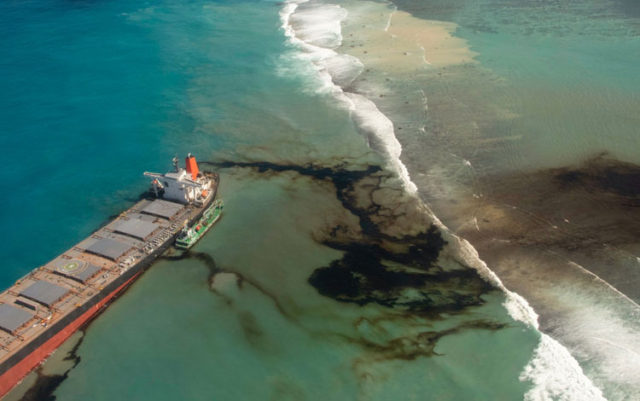
(5 minutes read)
· The oil slick off Mauritius is causing considerable damage to Mangroves and coral reefs around the island nation in the Indian Ocean
· Tons of fuel were leaked into the Mahebourg Lagoon after a Japanese ship ran aground off the island on 25th July
· There were complaints against the slackness shown by the authorities for the rescue operations knowing well how it could adversely affect the fragile ecosystem of the island nation
The oil slick off Mauritius is causing considerable damage to Mangroves and coral reefs around the island nation in the Indian Ocean. Tons of fuel were leaked into the Mahebourg Lagoon after a Japanese ship ran aground off the island on 25th July.
Environmentalists have voiced concern over the potential threat to the ecosystem particularly Mangroves and coral reefs, a star attraction for the tourists. Rescue operators said that the color of the water near the cracked vessel was dull. This could be because the vessel that is swayed by the waves is cracking coral reefs. There were complaints against the slackness shown by the authorities for the rescue operations knowing well how it could adversely affect the fragile ecosystem of the island nation.
The bulk carrier MV Wakashio, the Japanese bottom, was grounded on its way from China to Brazil close to the shore of Mauritius. Reports indicate that inclement weather was not the problem. The vessel deviated from the usual course and reportedly came closer to the shore. A detailed investigation is on to find the reasons for the oil slick.
In the meantime, there are experts who believe that the government was fully prepared since Mauritius was the ‘poster’ boy of regional oil spill prevention. Mauritius was one of the first African countries to finalize in 1990 an oil spill contingency plan with support from the International Maritime Organization (IMO) and the UN Environmental Programme.
Mauritius was one of the beneficiaries of the ‘Western Indian Ocean Island Oil Spill Contingency Planning’ project, which was implemented between 1998 and 2003, with an outlay of US$ 4 million funded by the World Bank. Another project ‘Marine Highway Development and Prevention Project’ running from 2007 to 2012 continued as a continuation of the earlier programs. Funded by the Global Environmental Facility with US$11 million, the program helped the country train more people in
oil spill prevention.











